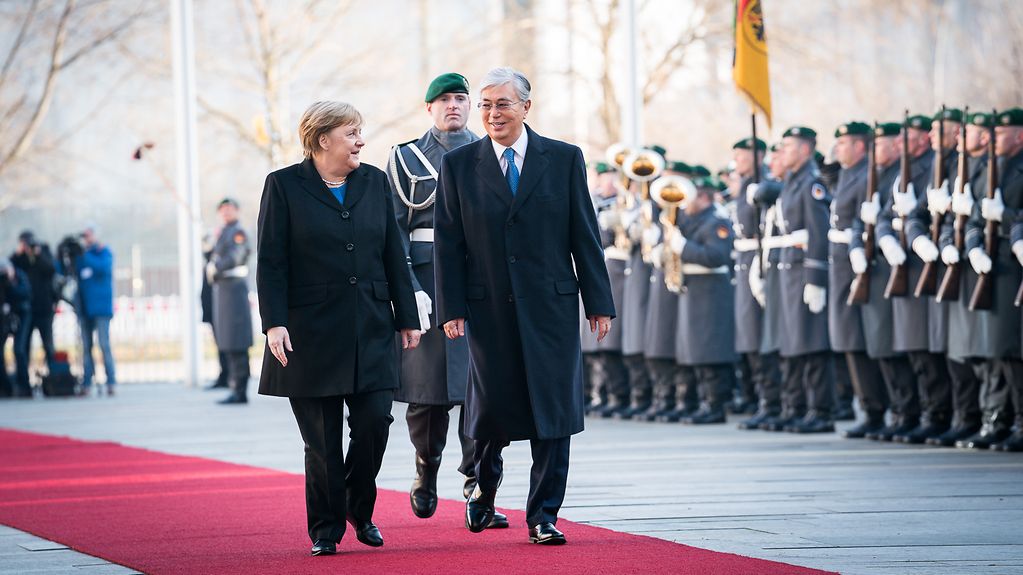Kazakh President Kassym-Jomart Tokayev in Berlin
When she welcomed the President of the Republic of Kazakhstan to the Federal Chancellery, Chancellor Angela Merkel pointed out that relations between the two countries are good. Their talks looked at stepping up economic relations, EU policy vis à vis Central Asia and the human rights situation in Kazakhstan.
2 min reading time

At the Federal Chancellery, Chancellor Angela Merkel welcomed the President of the Republic of Kazakhstan, Kassym-Jomart Tokayev with military honours
Photo: Bundesregierung/Kugler
The visit was designed to carry forward the good relations the two countries already enjoy, stressed Chancellor Angela Merkel following talks with the President of the Republic of Kazakhstan, Kassym-Jomart Tokayev. It was the first time the President has visited Germany since he took office in March 2019.
Potential in the field of the green economy
With respect to economic cooperation, the Chancellor also pointed out that "during the President’s visit, a whole series of agreements can be signed". Angela Merkel also reported that Germany can once again issue Hermes guarantees. She sees potential in the field of the green economy. "The country has begun to expand the use of renewables. We can also help with water resources management," she said.
Alongside economic cooperation, talks looked at relations between the European Union and Central Asia. With a view to the Silk Road project and Kazakhstan’s large neighbours, China and Russia, the Chancellor stressed how important the region is. "We Europeans, including us Germans, have good reason to see Central Asia as our neighbour and to become intensively involved in development in the region."
Freedom of opinion and freedom of assembly discussed
But the situation inside Kazakhstan was also on the agenda of the bilateral talks. The two leaders had a frank discussion about demonstrations and human rights in Kazakhstan, reported the Chancellor. "I am happy that the President intends to liberalise the right of assembly," said Angela Merkel.
During his visit to Germany, President Tokayev will also meet with Federal President Frank-Walter Steinmeier and Bundestag President Wolfgang Schäuble.
German-Kazakh relations
Kazakhstan is Germany’s most important economic partner in Central Asia. In 2012 the two countries entered into a partnership in the field of resources, industry and technology. In 2018 bilateral trade was worth over five billion euros. A total of over 200 German businesses are operating in Kazakhstan.
Germany’s cultural relations and education policy actors in Kazakhstan include the Goethe-Institut in Almaty and the Central Agency for Schools Abroad. A total of 16 Kazakh schools are part of Germany’s Schools: Partners for the Future global network. A beacon project of bilateral cooperation in higher education is the Kazakh-German University (GKU) in Almaty.
German-Kazakh development cooperation focuses on developing a technical and vocational education and training system, sustainable economic development, energy efficiency and disaster prevention.